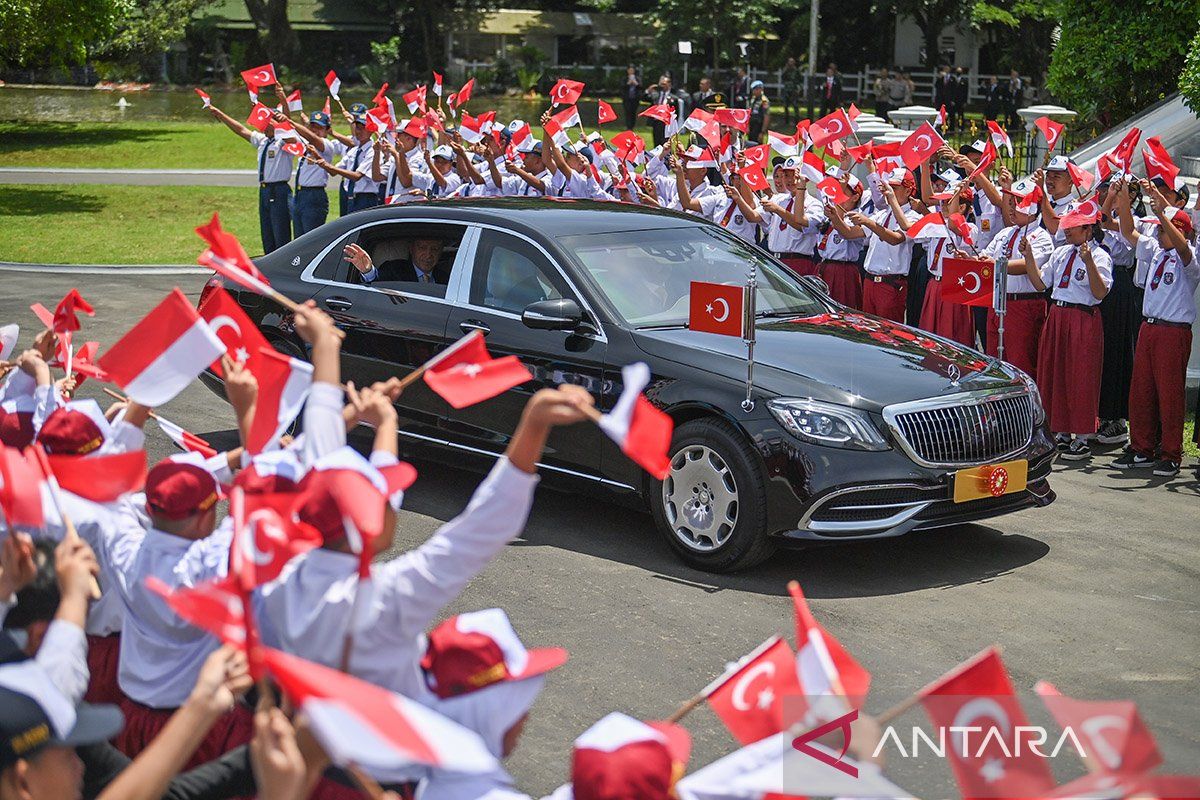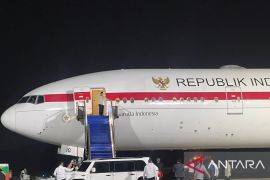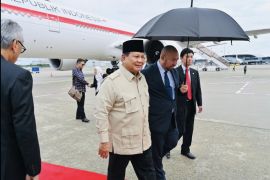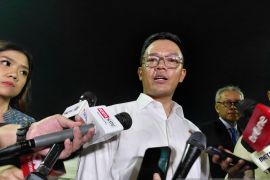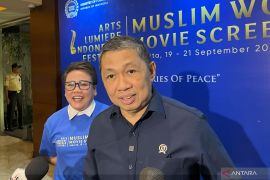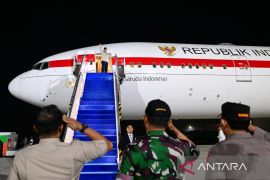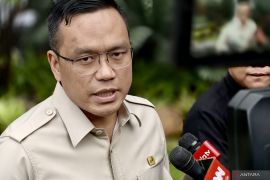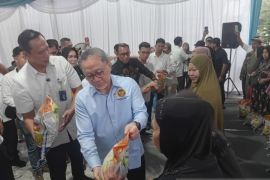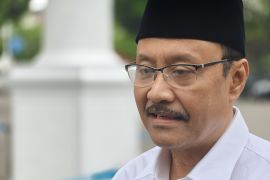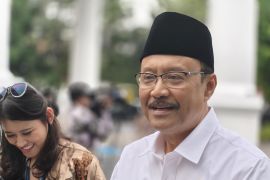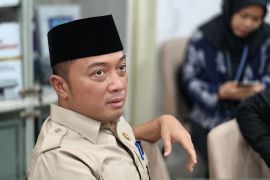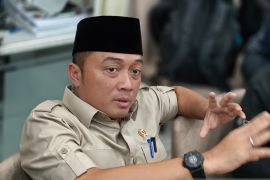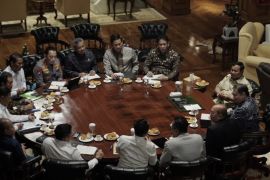Prabowo has repeatedly highlighted what he calls a “good neighbor foreign policy,” a principle he promoted even during his tenure as defense minister under Indonesia's seventh president, Joko Widodo (Jokowi).
“One thousand friends are too few; one enemy is too many. We will continue implementing the ‘good neighbor’ foreign policy,” he stated during the third presidential debate on January 7 last year in Jakarta.
His resolve is partly inspired by his admiration for Indonesia’s first president, Soekarno, who was among the pioneers of the Non-Aligned Movement and the 1955 Asian-African Conference.
These two major global milestones helped shape Indonesia’s approach to international relations, laying a solid foundation for the country to build positive ties while steering clear of security or military alliances.
Ahead of his presidential inauguration in October last year, Prabowo visited several countries in Southeast Asia and beyond, including Russia, China, and France.
Although he was still serving as defense minister during those trips, many believed the eighth president used these visits as opportunities to introduce himself as the incoming helmsman, set to succeed Jokowi after a decade in power.
Throughout the power transition period, Prabowo consistently emphasized the good neighbor policy, which he strongly believes is the right foreign policy approach for a diverse country like Indonesia—one that is admired for its cultural richness.
This belief likely stems from a deeply rooted Indonesian social value: neighbors helping one another in times of need and treating one another like family.
Related news: Prabowo, Erdogan discuss strategies to increase trade volume
More than neighbors
Since taking office, Prabowo has visited at least 14 countries in the hopes of solidifying Indonesia’s bilateral and multilateral ties, ultimately fostering an image of a good neighbor.
These countries are China, the United States, Peru, Brazil, the United Kingdom, Egypt, India, Malaysia, the United Arab Emirates, Türkiye, Qatar, Jordan, Brunei Darussalam, and Thailand.
Within his first six months in office, Prabowo made it clear to fellow world leaders—like Chinese President Xi Jinping, whom he met in November—that he aspired to be more than just another foreign politician.
His diplomatic tours were consistently marked by his ability to build genuine personal connections with the leaders he met. For example, in India, it was not uncommon to see him and Prime Minister Narendra Modi sharing warm, cordial gestures and referring to each other as “brother.”
After wrapping up his India agenda, the Indonesian head of state reunited with Malaysian Prime Minister Anwar Ibrahim in Kuala Lumpur.
At a joint press conference, Ibrahim praised Prabowo as a true friend—someone who stood by him through good times and hardship.
This personal bond has endured, dating back to the 1990s, when Prabowo proved to be a loyal friend during Ibrahim’s tenure as deputy prime minister.
Not even prison walls could separate them—Prabowo visited Anwar while he was behind bars. That same bond endures today, as the two stand side by side as fellow heads of government.
Not only did the Indonesian president show off his connections with Modi and Ibrahim but he also demonstrated how he and Turkish President Recep Tayyip Erdogan had become trustworthy allies.
A heartfelt moment unfolded during Erdogan’s visit to Indonesia in February. Upon his arrival, President Prabowo personally welcomed him, sharing an umbrella as they walked together past guards of honor toward a vehicle waiting in the gentle Jakarta night rain.
Prabowo went even further, arranging a series of vivid reception gestures involving hundreds of schoolchildren waving Indonesian and Turkish flags, as well as a cavalry escort along Erdogan’s way to the Bogor Palace, where the two held a bilateral meeting.
“I am wondering whether I will encounter a similar view along my political journey ahead. I can’t tell,” the Turkish president stated while expressing his elation over Indonesia’s warm reception.
Those events in Indonesia were not the end of the line. Erdogan later reciprocated by personally welcoming his Indonesian counterpart upon his arrival in the Turkish capital of Ankara.
Among Prabowo's many diplomatic exchanges with world leaders, one that stands out is the unforgettable reception he received during his reunion with his longtime friend, King Abdullah II of Jordan.
The Jordanian monarch had his royal jet fighters escort Prabowo as the Indonesian leader flew to Amman after concluding his agenda in Doha, Qatar.
Even before Prabowo disembarked his plane, his royal friend stood ready to greet him at the steps. To no one’s surprise, the king warmly embraced his longtime friend as they reunited.
The sovereign even personally drove Prabowo to the hotel, the two sitting side by side in the car.
“We share a decades-long friendship, dating back to our time as young soldiers,” King Abdullah said as he reflected on his bond with the Indonesian president.
Another notable moment was when Prabowo received the Darjah Kerabat Laila Utama Yang Amat Dihormati (Most Esteemed Family Order of Laila Utama) directly from Sultan Hassanal Bolkiah of Brunei Darussalam in May.
This decoration, conferred at the Nurul Iman Palace in Bandar Seri Begawan, is the manifestation of Prabowo’s success in translating his good neighbor policy into reality.
Why? Because Sultan Bolkiah bestowed this honor only on individuals who have left a distinguished mark in their countries’ ties with Brunei Darussalam.
The Sultanate of Brunei Darussalam presented this honor as its highest recognition for heads of state and world leaders who have significantly contributed to advancing cooperative relations with Brunei Darussalam.
More than a neighbor, Prabowo envisions Indonesia as a brother to like-minded nations—a goodwill he has demonstrated through his intensive diplomatic outreach.
Related news: Indonesia keen to befriend all countries: President Prabowo
Seeking true friends
As the world becomes increasingly divided, President Prabowo has made it clear that he intends to counter this negative trend by building personal bonds with fellow leaders, setting a positive example for others.
These relationships could become invaluable assets for Indonesia, especially since strong international ties often bloom from the personal connections between leaders.
Philips J. Vermonte, spokesperson for the Indonesian Presidential Communication Office, once said that such personal bonds can increase the likelihood of other countries stepping in to support Indonesia during challenging times.
In today’s tense geopolitical climate, the old saying, “a friend in need is a friend indeed,” is more relevant than ever.
For example, the United States’ new world-shaking tariff policy has had global repercussions, prompting Indonesia and other like-minded countries to increase communication for the common good.
Now more than ever, Indonesia’s good neighbor policy is expected to pay off—paving the way for more effective, well-coordinated economic responses.
Related news: Prabowo's meeting with Putin reflects RI's foreign policy: House
Editor: Rahmad Nasution
Copyright © ANTARA 2025
